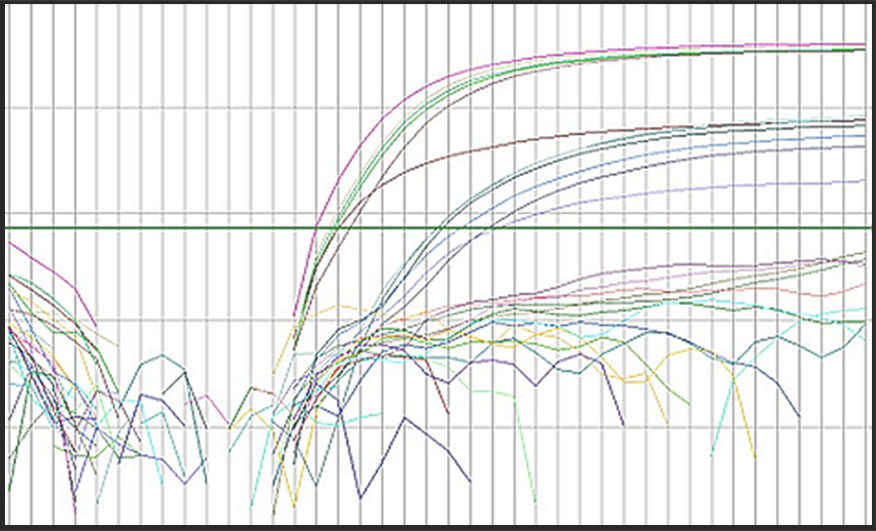We didn’t invent the lab test,
We simply perfected it.
 for detection of SARS-CoV-2 by RT-PCR, DNA
for detection of SARS-CoV-2 by RT-PCR, DNA Quality means doing it precisely, even when the lab is behind closed doors.
The Inspiration for the Peace of Mind Experience.
PCR testing is by far the most fascinating method I’ve ever worked with. It is a precise, reliable, and a highly scientific method for taking a micro-sample of DNA and amplifying it into a size where we can get a detailed, naked-eye visual. In 1993, Kary Bunks Mullis won the noble prize for his invention of the PCR technique. As we start off 2021, it has clearly stood the test of time.
I wanted to challenge our Research & Development team and create an assay that could meet the following criteria.
- We must be 10x more sensitive than what is currently being offered in the marketplace for COVID-19 testing.
- We must exceed FDA mandatory guidelines for Laboratory Developed Tests.
- Increase testing capacity.
- Guarantee all clients results in 24hrs or less.
Today, the team at Access has completed this challenging mission. We now bring to you the highest quality test, world-class customer service, and a peace of mind. Your COVID-19 tests are performed in-house at our high tech, state of the art laboratory using precise robotic technology and the latest instrumentation for unparalleled scientific performance and speed. Results in less than 24hrs.
Please enjoy this read on the Gold Standard for COVID-19 testing.
With Pleasure,
Ryan E El-Hosseiny, CEO
Access
We don't just deliver results, we provide peace of mind.TM
The Swab Sample
The collection device for Global Direct is a nasal swab which also includes a transport tube. Not all swabs are the same. A nasal swab is a lot less invasive than a nasopharyngeal swab. Choosing the right transport method and swab for testing plays an important role in ensuring the most accurate results.
The RNA Sample
Your RNA is located on the swab. RNA (Ribonucleic acid) functions in the cellular protein synthesis and replaces DNA (Deoxyribonucleic acid) as a carrier of genetic codes in some viruses such as SARS-CoV-2. At Access, we specifically secure the RNA so it may go through the RT-PCR technique.
Securing the RNA
Precision robotic technology is used along with high-grade chemicals and reagents to secure the RNA from your swab sample. RNA samples are brought down to microliters. For example, 5ul (microliters) is 0.005mL.
The PCR Set up
5ul are pipetted into a micro size 96-well plate. Next, the optical film is carefully placed over each plate. The film is sealed tight around each well to prevent evaporation, cross-contamination and will ensure the camera gets an accurate reading of each sample. The plate then enters the PCR Instrument.
The Access COVID-19 test is 100% Sensitive and 100% Specific.
RNA to DNA
The instruments we use are called Thermocyclers. They are responsible for amplifying the DNA. Using Reverse Transcription Polymerase Chain Reaction (RT-PCR), we turn the RNA into DNA to allow for amplification. The DNA is put through a sequence of temperature changes where many copies of the target region are exponentially amplified, giving us a precise result. This is RT-PCR.
Sensitivity and Specificity
Sensitivity and Specificity determine how well the test performs.
Sensitivity is how well the test can detect what it is looking for (SARS-CoV-2). The higher the sensitivity, the more you avoid the False Negatives.
Specificity is how specific the test is in only detecting what we are looking for (SARS-CoV-2) without something else interfering with the sample. Without a very specific test, you can run into False Positives.
Global Direct is 100% Sensitive and 100% Specific.

Approval
Each patient sample is carefully examined. Our highly skilled molecular techs carefully go through each patient's amplification plot and determine the result. If there is no amplification captured by the camera, or it is below the set threshold, then the result will be Negative.
Reporting your results
The Digital Report is ready to leave our Laboratory Information System and head to your secure online portal.
We don’t just deliver results, we provide peace of mind®
Copyright Access Medical Labs, Inc All rights reserved 2020.

Request Information
Feel free to contact our specialist to find out more about prices and services. We are always ready to answer your questions.
Disclaimer: By providing my phone number to “AccessMedLab”, I agree and acknowledge that “AccessMedLab” may send text messages to my wireless phone number for any purpose. Message and data rates may apply. We will only send one SMS as a reply to you, and you will be able to Opt-out by replying “STOP”.
Privacy Policy: No mobile information will be shared with third parties/affiliates for marketing/promotional purposes. All the above categories exclude text messaging originator opt-in data and consent; this information will not be shared with any third parties.please visit our Privacy Policy.